Deck 3: Derivatives
Question
Question
Question
Question
Question
Question
Question
Question
Question
Question
Question
Question
Question
Question
Question
Question
Question
Question
Question
Question
Question
Question
Question
Question
Question
Question
Question
Question
Question
Question
Question
Question
Question
Question
Question
Question
Question
Question
Question
Question
Question
Question
Question
Question
Question
Question
Question
Question
Question
Question
Question
Question
Question
Question
Question
Question
Question
Question
Question
Question
Question
Question
Question
Question
Question
Question
Question
Question
Question
Question
Question
Question
Question
Question
Question
Question
Question
Question
Question
Question

Unlock Deck
Sign up to unlock the cards in this deck!
Unlock Deck
Unlock Deck
1/367
Play
Full screen (f)
Deck 3: Derivatives
1
Find the slope of the line tangent tangent to the graph a the given point
-y = 2x + 1, x = -2
A) m = 4
B) m = 2
C) m = -4
D) m = -2
-y = 2x + 1, x = -2
A) m = 4
B) m = 2
C) m = -4
D) m = -2
m = 2
2
Find the slope of the line tangent tangent to the graph a the given point
-y = - 2x + 3, x = -1
- 2x + 3, x = -1
A) m = 3
B) m = -1
C) m = -4
D) m = -2
-y =
 - 2x + 3, x = -1
- 2x + 3, x = -1A) m = 3
B) m = -1
C) m = -4
D) m = -2
m = -4
3
Find the slope of the line tangent tangent to the graph a the given point
-y= + 10x, x = 8
+ 10x, x = 8
A) m = 144
B) m = 18
C) m = 26
D) m = 16
-y=
 + 10x, x = 8
+ 10x, x = 8A) m = 144
B) m = 18
C) m = 26
D) m = 16
m = 26
4
Find the slope of the line tangent tangent to the graph a the given point
-y = , x = 6
, x = 6
A) m =
B) m = -
C) m =
D) m = -
-y =
 , x = 6
, x = 6A) m =

B) m = -

C) m =

D) m = -


Unlock Deck
Unlock for access to all 367 flashcards in this deck.
Unlock Deck
k this deck
5
Find an equation for the tangent to the curve at the given point.
-y = , ( 4, 16)
, ( 4, 16)
A) y = 4x + 32
B) y = 12x - 32
C) y = 4x - 32
D) y = 32x + 12
-y =
 , ( 4, 16)
, ( 4, 16)A) y = 4x + 32
B) y = 12x - 32
C) y = 4x - 32
D) y = 32x + 12

Unlock Deck
Unlock for access to all 367 flashcards in this deck.
Unlock Deck
k this deck
6
Find an equation for the tangent to the curve at the given point.
-y = - 3, ( -4, 13)
- 3, ( -4, 13)
A) y = -4x - 19
B) y = -8x - 35
C) y = -8x - 38
D) y = -8x - 19
-y =
 - 3, ( -4, 13)
- 3, ( -4, 13)A) y = -4x - 19
B) y = -8x - 35
C) y = -8x - 38
D) y = -8x - 19

Unlock Deck
Unlock for access to all 367 flashcards in this deck.
Unlock Deck
k this deck
7
Find an equation for the tangent to the curve at the given point.
-y = + 1, ( -4, 17)
+ 1, ( -4, 17)
A) y = -8x - 15
B) y = -4x - 15
C) y = -8x - 30
D) y = -8x - 31
-y =
 + 1, ( -4, 17)
+ 1, ( -4, 17)A) y = -8x - 15
B) y = -4x - 15
C) y = -8x - 30
D) y = -8x - 31

Unlock Deck
Unlock for access to all 367 flashcards in this deck.
Unlock Deck
k this deck
8
Find an equation for the tangent to the curve at the given point.
-y = - x, ( -3, 12)
- x, ( -3, 12)
A) y = -7x + 9
B) y = -7x + 6
C) y = -7x - 6
D) y = -7x - 9
-y =
 - x, ( -3, 12)
- x, ( -3, 12)A) y = -7x + 9
B) y = -7x + 6
C) y = -7x - 6
D) y = -7x - 9

Unlock Deck
Unlock for access to all 367 flashcards in this deck.
Unlock Deck
k this deck
9
Find an equation for the tangent to the curve at the given point.
-y = x - , ( 2, -2)
, ( 2, -2)
A) y = 5x + 4
B) y = -3x + 4
C) y = 5x - 4
D) y = 3x + 4
-y = x -
 , ( 2, -2)
, ( 2, -2)A) y = 5x + 4
B) y = -3x + 4
C) y = 5x - 4
D) y = 3x + 4

Unlock Deck
Unlock for access to all 367 flashcards in this deck.
Unlock Deck
k this deck
10
Find an equation for the tangent to the curve at the given point.
-h(x) = - 36t - 5, ( 6, -5)
- 36t - 5, ( 6, -5)
A) y = 67t - 437
B) y = -5
C) y = 72t - 437
D) y = 72t - 5
-h(x) =
 - 36t - 5, ( 6, -5)
- 36t - 5, ( 6, -5)A) y = 67t - 437
B) y = -5
C) y = 72t - 437
D) y = 72t - 5

Unlock Deck
Unlock for access to all 367 flashcards in this deck.
Unlock Deck
k this deck
11
Find an equation for the tangent to the curve at the given point.
-f(x) = 6 - x + 9, ( 36, 9)
- x + 9, ( 36, 9)
A) y = - x + 9
x + 9
B) y = x - 27
x - 27
C) y = 9
D) y = - x + 27
x + 27
-f(x) = 6
 - x + 9, ( 36, 9)
- x + 9, ( 36, 9)A) y = -
 x + 9
x + 9B) y =
 x - 27
x - 27C) y = 9
D) y = -
 x + 27
x + 27
Unlock Deck
Unlock for access to all 367 flashcards in this deck.
Unlock Deck
k this deck
12
Graph the equation and its tangent.
-Graph y = 2 and the tangent to the curve at the point whose x-coordinate is 1.
and the tangent to the curve at the point whose x-coordinate is 1.
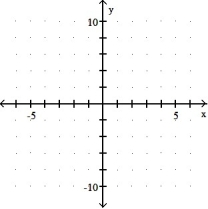
A)
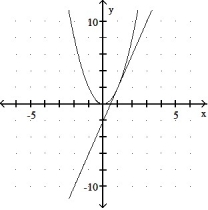
B)
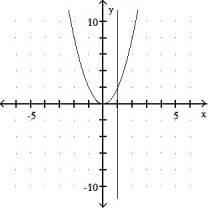
C)
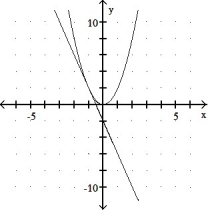
D)
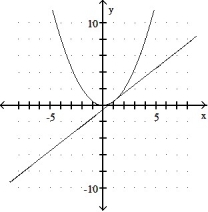
-Graph y = 2
 and the tangent to the curve at the point whose x-coordinate is 1.
and the tangent to the curve at the point whose x-coordinate is 1.
A)

B)

C)

D)


Unlock Deck
Unlock for access to all 367 flashcards in this deck.
Unlock Deck
k this deck
13
Graph the equation and its tangent.
-Graph y = 4 and the tangent to the curve at the point whose x-coordinate is -2.
and the tangent to the curve at the point whose x-coordinate is -2.
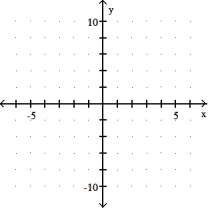
A)
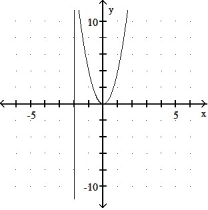
B)
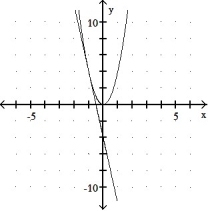
C)
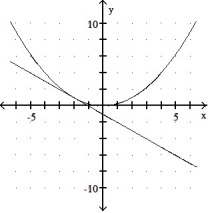
D)
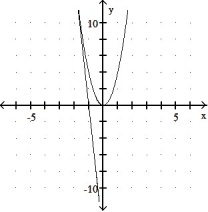
-Graph y = 4
 and the tangent to the curve at the point whose x-coordinate is -2.
and the tangent to the curve at the point whose x-coordinate is -2.
A)

B)

C)

D)


Unlock Deck
Unlock for access to all 367 flashcards in this deck.
Unlock Deck
k this deck
14
Graph the equation and its tangent.
-Graph y = x2 - 2x + 1 and the tangent to the curve at the point whose x-coordinate is 1.
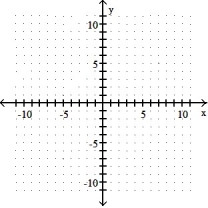
A)
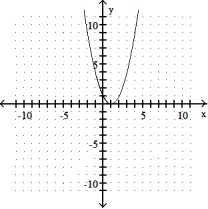
B)
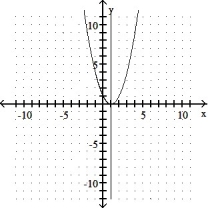
C)
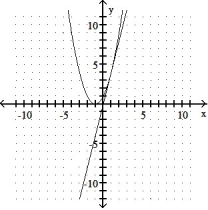
D)
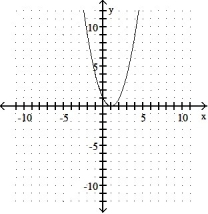
-Graph y = x2 - 2x + 1 and the tangent to the curve at the point whose x-coordinate is 1.

A)

B)

C)

D)


Unlock Deck
Unlock for access to all 367 flashcards in this deck.
Unlock Deck
k this deck
15
Graph the equation and its tangent.
-Graph y = x2 - 2x - 3 and the tangent to the curve at the point whose x-coordinate is -2.
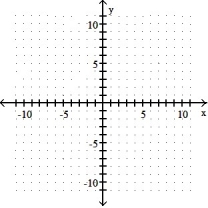
A)
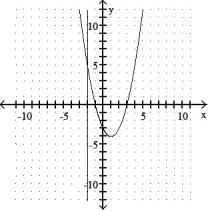
B)
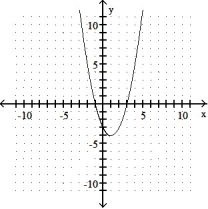
C)
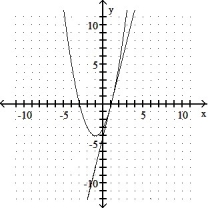
D)
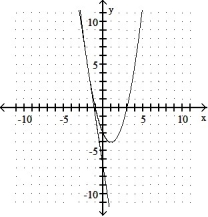
-Graph y = x2 - 2x - 3 and the tangent to the curve at the point whose x-coordinate is -2.

A)

B)

C)

D)


Unlock Deck
Unlock for access to all 367 flashcards in this deck.
Unlock Deck
k this deck
16
Graph the equation and its tangent.
-Graph y = + 5 and the tangent to the curve at the point whose x-coordinate is 0.
+ 5 and the tangent to the curve at the point whose x-coordinate is 0.
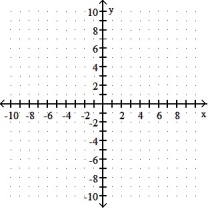
A)
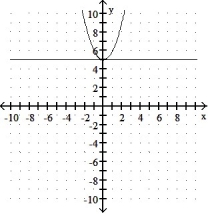
B)
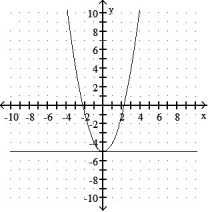
C)
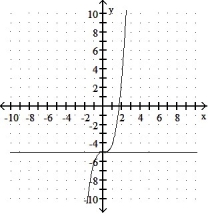
D)
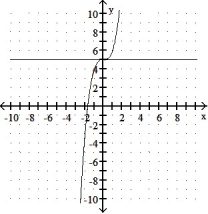
-Graph y =
 + 5 and the tangent to the curve at the point whose x-coordinate is 0.
+ 5 and the tangent to the curve at the point whose x-coordinate is 0.
A)

B)

C)

D)


Unlock Deck
Unlock for access to all 367 flashcards in this deck.
Unlock Deck
k this deck
17
Calculate the derivative of the function. Then find the value of the derivative as specified.
-f(x) = 5x + 9; (2)
(2)
A) (x) = 5;
(x) = 5;  (2) = 5
(2) = 5
B) (x) = 9;
(x) = 9;  (2) = 9
(2) = 9
C) (x) = 5x;
(x) = 5x;  (2) = 10
(2) = 10
D) (x) = 0;
(x) = 0;  (2) = 0
(2) = 0
-f(x) = 5x + 9;
 (2)
(2)A)
 (x) = 5;
(x) = 5;  (2) = 5
(2) = 5B)
 (x) = 9;
(x) = 9;  (2) = 9
(2) = 9C)
 (x) = 5x;
(x) = 5x;  (2) = 10
(2) = 10D)
 (x) = 0;
(x) = 0;  (2) = 0
(2) = 0
Unlock Deck
Unlock for access to all 367 flashcards in this deck.
Unlock Deck
k this deck
18
Calculate the derivative of the function. Then find the value of the derivative as specified.
-g(x) = 3x2 - 4x; (3)
(3)
A) (x) = 6x - 4;
(x) = 6x - 4;  (3) = 14
(3) = 14
B) (x) = 2x- 4;
(x) = 2x- 4;  (3) = 2
(3) = 2
C) (x) = 3x - 4;
(x) = 3x - 4;  (3) = 5
(3) = 5
D) (x) = 6x;
(x) = 6x;  (3) = 18
(3) = 18
-g(x) = 3x2 - 4x;
 (3)
(3)A)
 (x) = 6x - 4;
(x) = 6x - 4;  (3) = 14
(3) = 14B)
 (x) = 2x- 4;
(x) = 2x- 4;  (3) = 2
(3) = 2C)
 (x) = 3x - 4;
(x) = 3x - 4;  (3) = 5
(3) = 5D)
 (x) = 6x;
(x) = 6x;  (3) = 18
(3) = 18
Unlock Deck
Unlock for access to all 367 flashcards in this deck.
Unlock Deck
k this deck
19
Calculate the derivative of the function. Then find the value of the derivative as specified.
-f(x) = x2 + 7x - 2; (0)
(0)
A) (x) = 2x + 7;
(x) = 2x + 7;  (0) = 7
(0) = 7
B) (x) = 2x - 2;
(x) = 2x - 2;  (0) = - 2
(0) = - 2
C) (x) = x + 7;
(x) = x + 7;  (0) = 7
(0) = 7
D) (x) = 2x;
(x) = 2x;  (0) = 0
(0) = 0
-f(x) = x2 + 7x - 2;
 (0)
(0)A)
 (x) = 2x + 7;
(x) = 2x + 7;  (0) = 7
(0) = 7B)
 (x) = 2x - 2;
(x) = 2x - 2;  (0) = - 2
(0) = - 2C)
 (x) = x + 7;
(x) = x + 7;  (0) = 7
(0) = 7D)
 (x) = 2x;
(x) = 2x;  (0) = 0
(0) = 0
Unlock Deck
Unlock for access to all 367 flashcards in this deck.
Unlock Deck
k this deck
20
Calculate the derivative of the function. Then find the value of the derivative as specified.
-g(x) = x3 + 5x; (1)
(1)
A)
B)
C)
D)
-g(x) = x3 + 5x;
 (1)
(1)A)

B)

C)

D)


Unlock Deck
Unlock for access to all 367 flashcards in this deck.
Unlock Deck
k this deck
21
Calculate the derivative of the function. Then find the value of the derivative as specified.
-f(x) = ;
;  (-1)
(-1)
A)
B)
C)
D)
-f(x) =
 ;
;  (-1)
(-1)A)

B)

C)

D)


Unlock Deck
Unlock for access to all 367 flashcards in this deck.
Unlock Deck
k this deck
22
Calculate the derivative of the function. Then find the value of the derivative as specified.
-g(x) = - ;
;  (-2)
(-2)
A)
B)
C)
D)
-g(x) = -
 ;
;  (-2)
(-2)A)

B)

C)

D)


Unlock Deck
Unlock for access to all 367 flashcards in this deck.
Unlock Deck
k this deck
23
Calculate the derivative of the function. Then find the value of the derivative as specified.
-f(x) = ;
;  (0)
(0)
A)
B)
C)
D)
-f(x) =
 ;
;  (0)
(0)A)

B)

C)

D)


Unlock Deck
Unlock for access to all 367 flashcards in this deck.
Unlock Deck
k this deck
24
Calculate the derivative of the function. Then find the value of the derivative as specified.
- if s =
if s =  - t
- t
A)
B)
C)
D)
-
 if s =
if s =  - t
- tA)

B)

C)

D)


Unlock Deck
Unlock for access to all 367 flashcards in this deck.
Unlock Deck
k this deck
25
Calculate the derivative of the function. Then find the value of the derivative as specified.
- if r =
if r = 
A)
B)
C)
D)
-
 if r =
if r = 
A)

B)

C)

D)


Unlock Deck
Unlock for access to all 367 flashcards in this deck.
Unlock Deck
k this deck
26
Find the derivative of the function at the given point and interpret the physical meaning of this quantity. Include units in your answer.
-The cost C, in dollars, of a rental car driven for m miles is given by C(m) = 25 + 0.16 m. Find (50).
(50).
A) (50) = 0.16 dollars; the cost increases at an instantaneous rate of $0.16 when the car is driven 50 miles.
(50) = 0.16 dollars; the cost increases at an instantaneous rate of $0.16 when the car is driven 50 miles.
B) (50) = 8 dollars pr mile; the cost increases at an instantaneous rate of $8.00 per mile when the car is driven 50 miles.
(50) = 8 dollars pr mile; the cost increases at an instantaneous rate of $8.00 per mile when the car is driven 50 miles.
C) (50) = 8 dollars; the instantaneous cost is $8.00 when the car is driven 50 miles.
(50) = 8 dollars; the instantaneous cost is $8.00 when the car is driven 50 miles.
D) (50) = 0.16 dollars per mile; the cost increases at an instantaneous rate of $0.16 per mile when the car is driven 50 miles.
(50) = 0.16 dollars per mile; the cost increases at an instantaneous rate of $0.16 per mile when the car is driven 50 miles.
-The cost C, in dollars, of a rental car driven for m miles is given by C(m) = 25 + 0.16 m. Find
 (50).
(50).A)
 (50) = 0.16 dollars; the cost increases at an instantaneous rate of $0.16 when the car is driven 50 miles.
(50) = 0.16 dollars; the cost increases at an instantaneous rate of $0.16 when the car is driven 50 miles.B)
 (50) = 8 dollars pr mile; the cost increases at an instantaneous rate of $8.00 per mile when the car is driven 50 miles.
(50) = 8 dollars pr mile; the cost increases at an instantaneous rate of $8.00 per mile when the car is driven 50 miles.C)
 (50) = 8 dollars; the instantaneous cost is $8.00 when the car is driven 50 miles.
(50) = 8 dollars; the instantaneous cost is $8.00 when the car is driven 50 miles.D)
 (50) = 0.16 dollars per mile; the cost increases at an instantaneous rate of $0.16 per mile when the car is driven 50 miles.
(50) = 0.16 dollars per mile; the cost increases at an instantaneous rate of $0.16 per mile when the car is driven 50 miles.
Unlock Deck
Unlock for access to all 367 flashcards in this deck.
Unlock Deck
k this deck
27
Find the derivative of the function at the given point and interpret the physical meaning of this quantity. Include units in your answer.
-Suppose that the speed of a train approaching a station is given by v (t) = , for 0 t 8, where t is measured in seconds and v(t) is measured in meters per second. Find
, for 0 t 8, where t is measured in seconds and v(t) is measured in meters per second. Find  (5).
(5).
A) (5) = -3 m/s; the instantaneous rate of change in the train's speed is -3 m/s at t = 5 s.
(5) = -3 m/s; the instantaneous rate of change in the train's speed is -3 m/s at t = 5 s.
B) (5) = 6 m/s per second; the instantaneous rate of change in the train's speed is 6 m/
(5) = 6 m/s per second; the instantaneous rate of change in the train's speed is 6 m/  at t = 5 s.
at t = 5 s.
C) (5) = -3 m/s per second; the instantaneous rate of change in the train's speed is -3 m/
(5) = -3 m/s per second; the instantaneous rate of change in the train's speed is -3 m/  at t = 5 s.
at t = 5 s.
D) (5) = -6 m/s per second; the instantaneous rate of change in the train's speed is -6 m/
(5) = -6 m/s per second; the instantaneous rate of change in the train's speed is -6 m/  at t = 5 s.
at t = 5 s.
-Suppose that the speed of a train approaching a station is given by v (t) =
 , for 0 t 8, where t is measured in seconds and v(t) is measured in meters per second. Find
, for 0 t 8, where t is measured in seconds and v(t) is measured in meters per second. Find  (5).
(5).A)
 (5) = -3 m/s; the instantaneous rate of change in the train's speed is -3 m/s at t = 5 s.
(5) = -3 m/s; the instantaneous rate of change in the train's speed is -3 m/s at t = 5 s.B)
 (5) = 6 m/s per second; the instantaneous rate of change in the train's speed is 6 m/
(5) = 6 m/s per second; the instantaneous rate of change in the train's speed is 6 m/  at t = 5 s.
at t = 5 s.C)
 (5) = -3 m/s per second; the instantaneous rate of change in the train's speed is -3 m/
(5) = -3 m/s per second; the instantaneous rate of change in the train's speed is -3 m/  at t = 5 s.
at t = 5 s.D)
 (5) = -6 m/s per second; the instantaneous rate of change in the train's speed is -6 m/
(5) = -6 m/s per second; the instantaneous rate of change in the train's speed is -6 m/  at t = 5 s.
at t = 5 s.
Unlock Deck
Unlock for access to all 367 flashcards in this deck.
Unlock Deck
k this deck
28
Find the derivative of the function at the given point and interpret the physical meaning of this quantity. Include units in your answer.
-The amount of a medication (in mg) in the bloodstream t hours after the medication is taken is given by M(t). Estimate the values of (1) and
(1) and  (6), rounding to the nearest whole number. Include units on your answers and interpret the physical meaning of these values.
(6), rounding to the nearest whole number. Include units on your answers and interpret the physical meaning of these values. 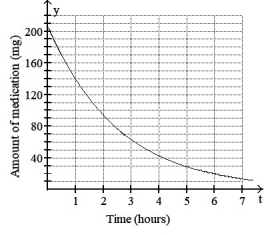
A)
B)
C)
D)
-The amount of a medication (in mg) in the bloodstream t hours after the medication is taken is given by M(t). Estimate the values of
 (1) and
(1) and  (6), rounding to the nearest whole number. Include units on your answers and interpret the physical meaning of these values.
(6), rounding to the nearest whole number. Include units on your answers and interpret the physical meaning of these values. 
A)

B)

C)

D)


Unlock Deck
Unlock for access to all 367 flashcards in this deck.
Unlock Deck
k this deck
29
The graph of a function is given. Choose the answer that represents the graph of its derivative.
-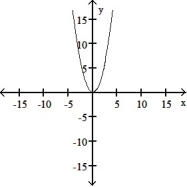
A)
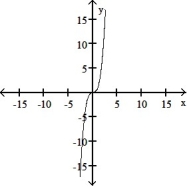
B)
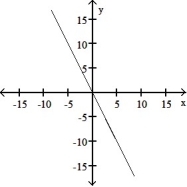
C)
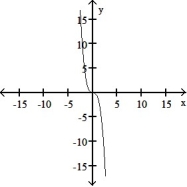
D)
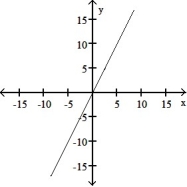
-

A)

B)

C)

D)


Unlock Deck
Unlock for access to all 367 flashcards in this deck.
Unlock Deck
k this deck
30
The graph of a function is given. Choose the answer that represents the graph of its derivative.
-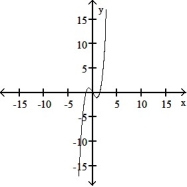
A)
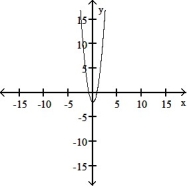
B)
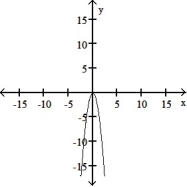
C)
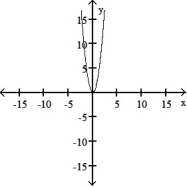
D)
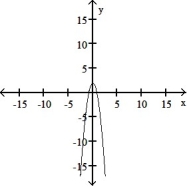
-

A)

B)

C)

D)


Unlock Deck
Unlock for access to all 367 flashcards in this deck.
Unlock Deck
k this deck
31
The graph of a function is given. Choose the answer that represents the graph of its derivative.
-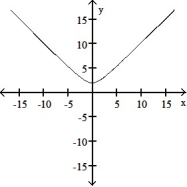
A)
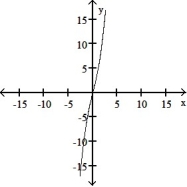
B)
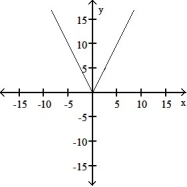
C)
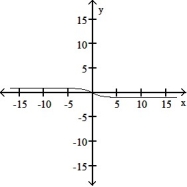
D)
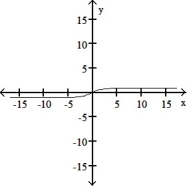
-

A)

B)

C)

D)


Unlock Deck
Unlock for access to all 367 flashcards in this deck.
Unlock Deck
k this deck
32
The graph of a function is given. Choose the answer that represents the graph of its derivative.
-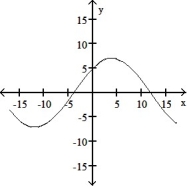
A)
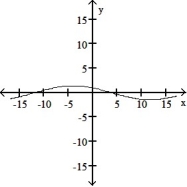
B)
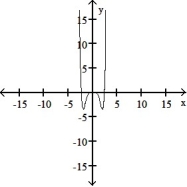
C)
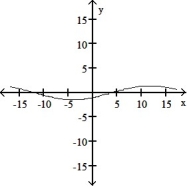
D)
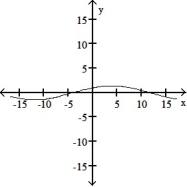
-

A)

B)

C)

D)


Unlock Deck
Unlock for access to all 367 flashcards in this deck.
Unlock Deck
k this deck
33
The graph of a function is given. Choose the answer that represents the graph of its derivative.
-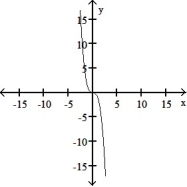
A)
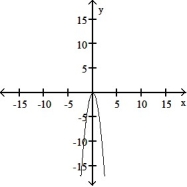
B)
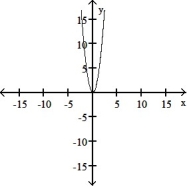
C)
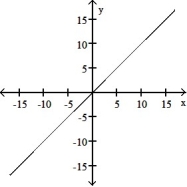
D)
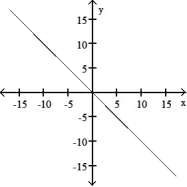
-

A)

B)

C)

D)


Unlock Deck
Unlock for access to all 367 flashcards in this deck.
Unlock Deck
k this deck
34
The graph of a function is given. Choose the answer that represents the graph of its derivative.
-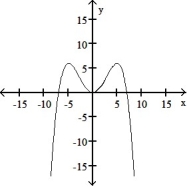
A)
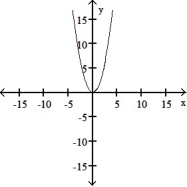
B)
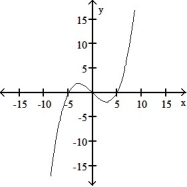 .
.
C)
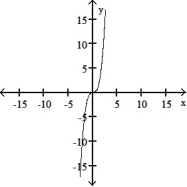
D)
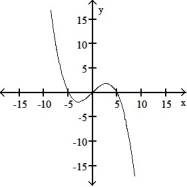
-

A)

B)
 .
.C)

D)


Unlock Deck
Unlock for access to all 367 flashcards in this deck.
Unlock Deck
k this deck
35
The graph of a function is given. Choose the answer that represents the graph of its derivative.
-The graph of y = f(x) in the accompanying figure is made of line segments joined end to end. Graph the derivative of f.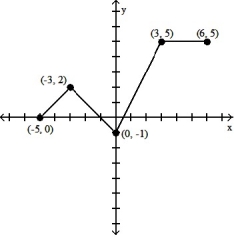
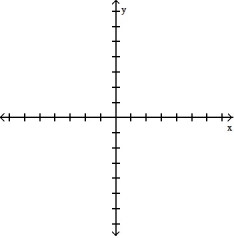
A)
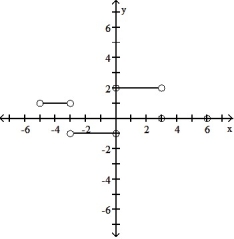
B)
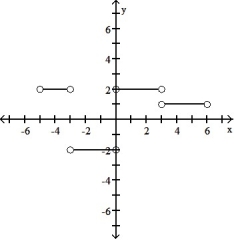
C)
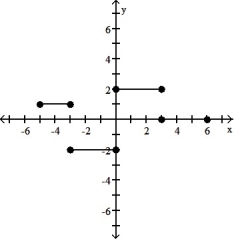
D)
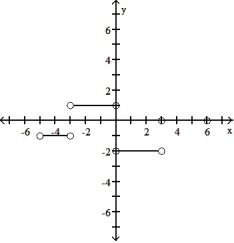
-The graph of y = f(x) in the accompanying figure is made of line segments joined end to end. Graph the derivative of f.


A)

B)

C)

D)


Unlock Deck
Unlock for access to all 367 flashcards in this deck.
Unlock Deck
k this deck
36
The graph of a function is given. Choose the answer that represents the graph of its derivative.
-Use the following information to graph the function f over the closed interval [-5, 6].
i. The graph of f is made of closed line segments joined end to end.
ii. The graph starts at the point (-5, 1).
iii. The derivative of f is the step function in the figure shown here.
![<strong>The graph of a function is given. Choose the answer that represents the graph of its derivative. -Use the following information to graph the function f over the closed interval [-5, 6]. i. The graph of f is made of closed line segments joined end to end. ii. The graph starts at the point (-5, 1). iii. The derivative of f is the step function in the figure shown here. </strong> A) B) C) D)](https://storage.examlex.com/TB9662/11ee9522_33c5_0341_bdb6_751c613a831c_TB9662_11.jpg)
![<strong>The graph of a function is given. Choose the answer that represents the graph of its derivative. -Use the following information to graph the function f over the closed interval [-5, 6]. i. The graph of f is made of closed line segments joined end to end. ii. The graph starts at the point (-5, 1). iii. The derivative of f is the step function in the figure shown here. </strong> A) B) C) D)](https://storage.examlex.com/TB9662/11ee9522_33c5_0342_bdb6_b7f9a04726cd_TB9662_11.jpg)
A)
![<strong>The graph of a function is given. Choose the answer that represents the graph of its derivative. -Use the following information to graph the function f over the closed interval [-5, 6]. i. The graph of f is made of closed line segments joined end to end. ii. The graph starts at the point (-5, 1). iii. The derivative of f is the step function in the figure shown here. </strong> A) B) C) D)](https://storage.examlex.com/TB9662/11ee9522_33c5_0343_bdb6_a12c47fbff33_TB9662_11.jpg)
B)
![<strong>The graph of a function is given. Choose the answer that represents the graph of its derivative. -Use the following information to graph the function f over the closed interval [-5, 6]. i. The graph of f is made of closed line segments joined end to end. ii. The graph starts at the point (-5, 1). iii. The derivative of f is the step function in the figure shown here. </strong> A) B) C) D)](https://storage.examlex.com/TB9662/11ee9522_33c5_0344_bdb6_8f66fedc9702_TB9662_11.jpg)
C)
![<strong>The graph of a function is given. Choose the answer that represents the graph of its derivative. -Use the following information to graph the function f over the closed interval [-5, 6]. i. The graph of f is made of closed line segments joined end to end. ii. The graph starts at the point (-5, 1). iii. The derivative of f is the step function in the figure shown here. </strong> A) B) C) D)](https://storage.examlex.com/TB9662/11ee9522_33c5_0345_bdb6_a5fc39ca12a2_TB9662_11.jpg)
D)
![<strong>The graph of a function is given. Choose the answer that represents the graph of its derivative. -Use the following information to graph the function f over the closed interval [-5, 6]. i. The graph of f is made of closed line segments joined end to end. ii. The graph starts at the point (-5, 1). iii. The derivative of f is the step function in the figure shown here. </strong> A) B) C) D)](https://storage.examlex.com/TB9662/11ee9522_33c5_0346_bdb6_25130c6baf2f_TB9662_11.jpg)
-Use the following information to graph the function f over the closed interval [-5, 6].
i. The graph of f is made of closed line segments joined end to end.
ii. The graph starts at the point (-5, 1).
iii. The derivative of f is the step function in the figure shown here.
![<strong>The graph of a function is given. Choose the answer that represents the graph of its derivative. -Use the following information to graph the function f over the closed interval [-5, 6]. i. The graph of f is made of closed line segments joined end to end. ii. The graph starts at the point (-5, 1). iii. The derivative of f is the step function in the figure shown here. </strong> A) B) C) D)](https://storage.examlex.com/TB9662/11ee9522_33c5_0341_bdb6_751c613a831c_TB9662_11.jpg)
![<strong>The graph of a function is given. Choose the answer that represents the graph of its derivative. -Use the following information to graph the function f over the closed interval [-5, 6]. i. The graph of f is made of closed line segments joined end to end. ii. The graph starts at the point (-5, 1). iii. The derivative of f is the step function in the figure shown here. </strong> A) B) C) D)](https://storage.examlex.com/TB9662/11ee9522_33c5_0342_bdb6_b7f9a04726cd_TB9662_11.jpg)
A)
![<strong>The graph of a function is given. Choose the answer that represents the graph of its derivative. -Use the following information to graph the function f over the closed interval [-5, 6]. i. The graph of f is made of closed line segments joined end to end. ii. The graph starts at the point (-5, 1). iii. The derivative of f is the step function in the figure shown here. </strong> A) B) C) D)](https://storage.examlex.com/TB9662/11ee9522_33c5_0343_bdb6_a12c47fbff33_TB9662_11.jpg)
B)
![<strong>The graph of a function is given. Choose the answer that represents the graph of its derivative. -Use the following information to graph the function f over the closed interval [-5, 6]. i. The graph of f is made of closed line segments joined end to end. ii. The graph starts at the point (-5, 1). iii. The derivative of f is the step function in the figure shown here. </strong> A) B) C) D)](https://storage.examlex.com/TB9662/11ee9522_33c5_0344_bdb6_8f66fedc9702_TB9662_11.jpg)
C)
![<strong>The graph of a function is given. Choose the answer that represents the graph of its derivative. -Use the following information to graph the function f over the closed interval [-5, 6]. i. The graph of f is made of closed line segments joined end to end. ii. The graph starts at the point (-5, 1). iii. The derivative of f is the step function in the figure shown here. </strong> A) B) C) D)](https://storage.examlex.com/TB9662/11ee9522_33c5_0345_bdb6_a5fc39ca12a2_TB9662_11.jpg)
D)
![<strong>The graph of a function is given. Choose the answer that represents the graph of its derivative. -Use the following information to graph the function f over the closed interval [-5, 6]. i. The graph of f is made of closed line segments joined end to end. ii. The graph starts at the point (-5, 1). iii. The derivative of f is the step function in the figure shown here. </strong> A) B) C) D)](https://storage.examlex.com/TB9662/11ee9522_33c5_0346_bdb6_25130c6baf2f_TB9662_11.jpg)

Unlock Deck
Unlock for access to all 367 flashcards in this deck.
Unlock Deck
k this deck
37
The graph of a function is given. Choose the answer that represents the graph of its derivative.
-Sketch the derivative of the graph.
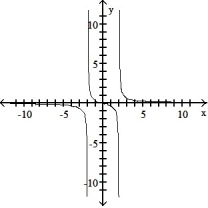
A)
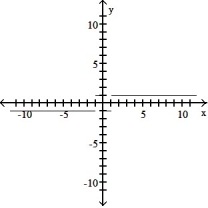
B)
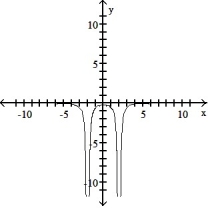
C)
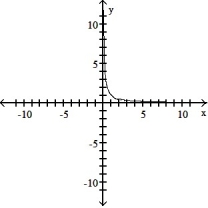
D)
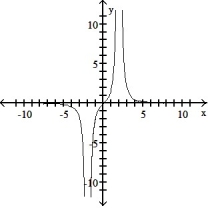
-Sketch the derivative of the graph.

A)

B)

C)

D)


Unlock Deck
Unlock for access to all 367 flashcards in this deck.
Unlock Deck
k this deck
38
Use limits to find the derivative function  for the given function f. Then evaluate
for the given function f. Then evaluate  (a) for the given values of a.
(a) for the given values of a.
-f(x) = - 4x; a = -2, 3
- 4x; a = -2, 3
A)
B)
C)
D)
 for the given function f. Then evaluate
for the given function f. Then evaluate  (a) for the given values of a.
(a) for the given values of a.-f(x) =
 - 4x; a = -2, 3
- 4x; a = -2, 3A)

B)

C)

D)


Unlock Deck
Unlock for access to all 367 flashcards in this deck.
Unlock Deck
k this deck
39
Use limits to find the derivative function  for the given function f. Then evaluate
for the given function f. Then evaluate  (a) for the given values of a.
(a) for the given values of a.
-f(s) = ; a = -1,
; a = -1, 
A)
B)
C)
D)
 for the given function f. Then evaluate
for the given function f. Then evaluate  (a) for the given values of a.
(a) for the given values of a.-f(s) =
 ; a = -1,
; a = -1, 
A)

B)

C)

D)


Unlock Deck
Unlock for access to all 367 flashcards in this deck.
Unlock Deck
k this deck
40
Use limits to find the derivative function  for the given function f. Then evaluate
for the given function f. Then evaluate  (a) for the given values of a.
(a) for the given values of a.
-A projectile is fired vertically upward into the air, and its position (in meters) above the ground after t seconds is given by the function s(t) = -4.9 + 30t.
+ 30t.
a.Find the instantaneous velocity function v (t).
b. Determine the instantaneous velocity of the projectile at t = 1 and t = 2 seconds.
A)
B)
C)
D)
 for the given function f. Then evaluate
for the given function f. Then evaluate  (a) for the given values of a.
(a) for the given values of a.-A projectile is fired vertically upward into the air, and its position (in meters) above the ground after t seconds is given by the function s(t) = -4.9
 + 30t.
+ 30t.a.Find the instantaneous velocity function v (t).
b. Determine the instantaneous velocity of the projectile at t = 1 and t = 2 seconds.
A)

B)

C)

D)


Unlock Deck
Unlock for access to all 367 flashcards in this deck.
Unlock Deck
k this deck
41
a. Find the derivative function f? for the function f.
b. Find an equation of the line tangent to the graph of f at (a, f(a)) for the given value of a.
-f(x) = 6 - 5x - 2; a = 1
- 5x - 2; a = 1
A) a. (x) = 12
(x) = 12  - 5; b. tangent line is y = 7x + 1
- 5; b. tangent line is y = 7x + 1
B) a. (x) = 12x - 5; b. tangent line is y = 7x - 8
(x) = 12x - 5; b. tangent line is y = 7x - 8
C) a. (x) = 12x - 5; b. tangent line is y = 12x - 13
(x) = 12x - 5; b. tangent line is y = 12x - 13
D) a. (x) = 12
(x) = 12  - 5; b. tangent line is y = 12x + 1
- 5; b. tangent line is y = 12x + 1
b. Find an equation of the line tangent to the graph of f at (a, f(a)) for the given value of a.
-f(x) = 6
 - 5x - 2; a = 1
- 5x - 2; a = 1A) a.
 (x) = 12
(x) = 12  - 5; b. tangent line is y = 7x + 1
- 5; b. tangent line is y = 7x + 1B) a.
 (x) = 12x - 5; b. tangent line is y = 7x - 8
(x) = 12x - 5; b. tangent line is y = 7x - 8C) a.
 (x) = 12x - 5; b. tangent line is y = 12x - 13
(x) = 12x - 5; b. tangent line is y = 12x - 13D) a.
 (x) = 12
(x) = 12  - 5; b. tangent line is y = 12x + 1
- 5; b. tangent line is y = 12x + 1
Unlock Deck
Unlock for access to all 367 flashcards in this deck.
Unlock Deck
k this deck
42
a. Find the derivative function f? for the function f.
b. Find an equation of the line tangent to the graph of f at (a, f(a)) for the given value of a.
-f(x) = ; a = -1
; a = -1
A)
B)
C)
D)
b. Find an equation of the line tangent to the graph of f at (a, f(a)) for the given value of a.
-f(x) =
 ; a = -1
; a = -1A)

B)

C)

D)


Unlock Deck
Unlock for access to all 367 flashcards in this deck.
Unlock Deck
k this deck
43
Find the derivative.
-y = x14
A) 14
B) 13
C) 14x14
D) 13
-y = x14
A) 14

B) 13

C) 14x14
D) 13


Unlock Deck
Unlock for access to all 367 flashcards in this deck.
Unlock Deck
k this deck
44
Find the derivative.
-y = 12
A) 0
B) 12
C) 11
D) 1
-y = 12
A) 0
B) 12
C) 11
D) 1

Unlock Deck
Unlock for access to all 367 flashcards in this deck.
Unlock Deck
k this deck
45
Find the derivative.
-y = - 7
A) - 7
B) - 35
C) - 35
D) - 35
-y = - 7

A) - 7

B) - 35

C) - 35

D) - 35


Unlock Deck
Unlock for access to all 367 flashcards in this deck.
Unlock Deck
k this deck
46
Find the derivative.
-y =

A)

B)

C) 28
D)

-y =


A)


B)


C) 28

D)



Unlock Deck
Unlock for access to all 367 flashcards in this deck.
Unlock Deck
k this deck
47
Find the derivative.
-y = 4 - 14x2
A) - 28x
B) 4 - 14x
C) - 28
D) 4 -28x
-y = 4 - 14x2
A) - 28x
B) 4 - 14x
C) - 28
D) 4 -28x

Unlock Deck
Unlock for access to all 367 flashcards in this deck.
Unlock Deck
k this deck
48
Find the derivative.
-y = 3 - 5x3
A) -15x2
B) -10x2
C) 3 - 15x2
D) -15x
-y = 3 - 5x3
A) -15x2
B) -10x2
C) 3 - 15x2
D) -15x

Unlock Deck
Unlock for access to all 367 flashcards in this deck.
Unlock Deck
k this deck
49
Find the derivative.
-y = 3x4 - 4x3 - 5
A) 12x3 - 12x2
B) 4x3 + 3x2 - 7
C) 4x3 + 3x2
D) 12x3 - 12x2 - 7
-y = 3x4 - 4x3 - 5
A) 12x3 - 12x2
B) 4x3 + 3x2 - 7
C) 4x3 + 3x2
D) 12x3 - 12x2 - 7

Unlock Deck
Unlock for access to all 367 flashcards in this deck.
Unlock Deck
k this deck
50
Find the derivative.
-s = 3t2 - 8t + 9
A) 6t2 - 8
B) 3t - 8
C) 6t - 8
D) 3t2 - 8
-s = 3t2 - 8t + 9
A) 6t2 - 8
B) 3t - 8
C) 6t - 8
D) 3t2 - 8

Unlock Deck
Unlock for access to all 367 flashcards in this deck.
Unlock Deck
k this deck
51
Find the derivative of the function
-g(t) = -
-  +
+ 
A)
B)
C)
D)
-g(t) =
 -
-  +
+ 
A)

B)

C)

D)


Unlock Deck
Unlock for access to all 367 flashcards in this deck.
Unlock Deck
k this deck
52
Find the derivative of the function
-f(x) =
A) (x) =
(x) = 
B) (x) =
(x) = 
C) (x) =
(x) = 
D) (x) =
(x) = 
-f(x) =

A)
 (x) =
(x) = 
B)
 (x) =
(x) = 
C)
 (x) =
(x) = 
D)
 (x) =
(x) = 

Unlock Deck
Unlock for access to all 367 flashcards in this deck.
Unlock Deck
k this deck
53
Find the derivative of the function by first expanding or simplifying the expression.
-f(x) = ( 4x - 2)( 4x + 1)
A) f'(x) = 16x - 4
B) f'(x) = 32x - 4
C) f'(x) = 32x - 2
D) f'(x) = 32x - 12
-f(x) = ( 4x - 2)( 4x + 1)
A) f'(x) = 16x - 4
B) f'(x) = 32x - 4
C) f'(x) = 32x - 2
D) f'(x) = 32x - 12

Unlock Deck
Unlock for access to all 367 flashcards in this deck.
Unlock Deck
k this deck
54
Find the derivative of the function by first expanding or simplifying the expression.
-f(x) = ( 2x - 3)( 5x3 - x2 + 1)
A) f'(x) = 10x3 + 17x2 - 51x + 2
B) f'(x) = 40x3 - 17x2 + 51x + 2
C) f'(x) = 30x3 + 51x2 - 17x + 2
D) f'(x) = 40x3 - 51x2 + 6x + 2
-f(x) = ( 2x - 3)( 5x3 - x2 + 1)
A) f'(x) = 10x3 + 17x2 - 51x + 2
B) f'(x) = 40x3 - 17x2 + 51x + 2
C) f'(x) = 30x3 + 51x2 - 17x + 2
D) f'(x) = 40x3 - 51x2 + 6x + 2

Unlock Deck
Unlock for access to all 367 flashcards in this deck.
Unlock Deck
k this deck
55
Find the derivative of the function by first expanding or simplifying the expression.
-f(x) = ( 6x + 5)2
A) f'(x) = 72x + 60
B) f'(x) = 36x + 25
C) f'(x) = 36x + 30
D) f'(x) = 12x + 10
-f(x) = ( 6x + 5)2
A) f'(x) = 72x + 60
B) f'(x) = 36x + 25
C) f'(x) = 36x + 30
D) f'(x) = 12x + 10

Unlock Deck
Unlock for access to all 367 flashcards in this deck.
Unlock Deck
k this deck
56
Find the derivative of the function by first expanding or simplifying the expression.
-f(x) =
A) f'(x) = x + 6
B) f'(x) = 1
C) f'(x) = 10x
D) f'(x) = 5
-f(x) =

A) f'(x) = x + 6
B) f'(x) = 1
C) f'(x) = 10x
D) f'(x) = 5

Unlock Deck
Unlock for access to all 367 flashcards in this deck.
Unlock Deck
k this deck
57
Find an equation of the tangent line at x = a.
-y = ; a = 2
; a = 2
A) y = 1x - 2
B) y = 4x - 1
C) y = 1x + 1
D) y = 1x - 1
-y =
 ; a = 2
; a = 2A) y = 1x - 2
B) y = 4x - 1
C) y = 1x + 1
D) y = 1x - 1

Unlock Deck
Unlock for access to all 367 flashcards in this deck.
Unlock Deck
k this deck
58
Find an equation of the tangent line at x = a.
-y = ; a = 4
; a = 4
A) y = 32x + 12
B) y = 12x - 32
C) y = 4x + 32
D) y = 4x - 32
-y =
 ; a = 4
; a = 4A) y = 32x + 12
B) y = 12x - 32
C) y = 4x + 32
D) y = 4x - 32

Unlock Deck
Unlock for access to all 367 flashcards in this deck.
Unlock Deck
k this deck
59
Find an equation of the tangent line at x = a.
-y = - 2; a = 3
- 2; a = 3
A) y = 6x - 11
B) y = 3x - 11
C) y = 6x - 22
D) y = 6x - 20
-y =
 - 2; a = 3
- 2; a = 3A) y = 6x - 11
B) y = 3x - 11
C) y = 6x - 22
D) y = 6x - 20

Unlock Deck
Unlock for access to all 367 flashcards in this deck.
Unlock Deck
k this deck
60
Find an equation of the tangent line at x = a.
-y = + 1; a = 3
+ 1; a = 3
A) y = 6x - 8
B) y = 6x - 16
C) y = 6x - 17
D) y = 3x - 8
-y =
 + 1; a = 3
+ 1; a = 3A) y = 6x - 8
B) y = 6x - 16
C) y = 6x - 17
D) y = 3x - 8

Unlock Deck
Unlock for access to all 367 flashcards in this deck.
Unlock Deck
k this deck
61
Find an equation of the tangent line at x = a.
-y = - x; a = 2
- x; a = 2
A) y = 3x + 6
B) y = 3x - 6
C) y = 3x - 4
D) y = 3x + 4
-y =
 - x; a = 2
- x; a = 2A) y = 3x + 6
B) y = 3x - 6
C) y = 3x - 4
D) y = 3x + 4

Unlock Deck
Unlock for access to all 367 flashcards in this deck.
Unlock Deck
k this deck
62
Find an equation of the tangent line at x = a.
-y = x - ; a = -4
; a = -4
A) y = -7x + 16
B) y = -9x + 16
C) y = 9x + 16
D) y = -7x - 16
-y = x -
 ; a = -4
; a = -4A) y = -7x + 16
B) y = -9x + 16
C) y = 9x + 16
D) y = -7x - 16

Unlock Deck
Unlock for access to all 367 flashcards in this deck.
Unlock Deck
k this deck
63
Find an equation of the tangent line at x = a.
-y = - 4x - 5; a = 2
- 4x - 5; a = 2
A) y = 3x - 21
B) y = 8x - 21
C) y = -5
D) y = 8x - 5
-y =
 - 4x - 5; a = 2
- 4x - 5; a = 2A) y = 3x - 21
B) y = 8x - 21
C) y = -5
D) y = 8x - 5

Unlock Deck
Unlock for access to all 367 flashcards in this deck.
Unlock Deck
k this deck
64
Provide an appropriate response.
-The curve y = a + bx + c passes through the point (2, 12) and is tangent to the line
+ bx + c passes through the point (2, 12) and is tangent to the line  at the origin. Find a, b, and c.
at the origin. Find a, b, and c.
A) a = 2, b = 0, c = 0
B) a = 4, b = 0, c = 1
C) a = 0, b = 1, c = 4
D) a = 1, b = 4, c = 0
-The curve y = a
 + bx + c passes through the point (2, 12) and is tangent to the line
+ bx + c passes through the point (2, 12) and is tangent to the line  at the origin. Find a, b, and c.
at the origin. Find a, b, and c.A) a = 2, b = 0, c = 0
B) a = 4, b = 0, c = 1
C) a = 0, b = 1, c = 4
D) a = 1, b = 4, c = 0

Unlock Deck
Unlock for access to all 367 flashcards in this deck.
Unlock Deck
k this deck
65
Provide an appropriate response.
-The curves y = a + b and y = 2
+ b and y = 2  + cx have a common tangent line at the point (-1, 0). Find a, b, and c.
+ cx have a common tangent line at the point (-1, 0). Find a, b, and c.
A) a = -1, b = 1, c = -2
B) a = 1, b = 0, c = 2
C) a - 2, b = 1, c = -1
D) a = 1, b = -1, c = 2
-The curves y = a
 + b and y = 2
+ b and y = 2  + cx have a common tangent line at the point (-1, 0). Find a, b, and c.
+ cx have a common tangent line at the point (-1, 0). Find a, b, and c.A) a = -1, b = 1, c = -2
B) a = 1, b = 0, c = 2
C) a - 2, b = 1, c = -1
D) a = 1, b = -1, c = 2

Unlock Deck
Unlock for access to all 367 flashcards in this deck.
Unlock Deck
k this deck
66
Provide an appropriate response.
-Find all points (x, y) on the graph of f(x) = 2 -3x with tangent lines parallel to the line
-3x with tangent lines parallel to the line 
A) ( 6, 9)
B) (0, 0), ( 3, 9)
C) ( 3, 18)
D) ( 3, 9)
-Find all points (x, y) on the graph of f(x) = 2
 -3x with tangent lines parallel to the line
-3x with tangent lines parallel to the line 
A) ( 6, 9)
B) (0, 0), ( 3, 9)
C) ( 3, 18)
D) ( 3, 9)

Unlock Deck
Unlock for access to all 367 flashcards in this deck.
Unlock Deck
k this deck
67
Provide an appropriate response.
-Find all points (x, y) on the graph of y = with tangent lines perpendicular to the line
with tangent lines perpendicular to the line 
A) ( 8, 2)
B) (0, 0), ( 4, 2)
C) (0, 0)
D) (0, 0), ( 8, 2)
-Find all points (x, y) on the graph of y =
 with tangent lines perpendicular to the line
with tangent lines perpendicular to the line 
A) ( 8, 2)
B) (0, 0), ( 4, 2)
C) (0, 0)
D) (0, 0), ( 8, 2)

Unlock Deck
Unlock for access to all 367 flashcards in this deck.
Unlock Deck
k this deck
68
Find the second derivative.
-y = 7x2 + 8x - 8
A) 14
B) 0
C) 7
D) 14x + 8
-y = 7x2 + 8x - 8
A) 14
B) 0
C) 7
D) 14x + 8

Unlock Deck
Unlock for access to all 367 flashcards in this deck.
Unlock Deck
k this deck
69
Find the second derivative.
-y = 7x4 - 4x2 + 6
A) 84x2 - 8
B) 84x2 - 8x
C) 28x2 - 8x
D) 28x2 - 8
-y = 7x4 - 4x2 + 6
A) 84x2 - 8
B) 84x2 - 8x
C) 28x2 - 8x
D) 28x2 - 8

Unlock Deck
Unlock for access to all 367 flashcards in this deck.
Unlock Deck
k this deck
70
Find the second derivative.
-y = 6x3 - 8x2 + 5
A) 16x - 36
B) 24x - 16
C) 16x - 24
D) 36x - 16
-y = 6x3 - 8x2 + 5
A) 16x - 36
B) 24x - 16
C) 16x - 24
D) 36x - 16

Unlock Deck
Unlock for access to all 367 flashcards in this deck.
Unlock Deck
k this deck
71
Find the second derivative.
-s = + 2
+ 2
A) 4t + 2
B)
C) 2t
D) 4t 2
-s =
 + 2
+ 2A) 4t + 2
B)

C) 2t
D) 4t 2

Unlock Deck
Unlock for access to all 367 flashcards in this deck.
Unlock Deck
k this deck
72
Find the second derivative.
-y = - 6
- 6
A) 11x
B) 11x - 6
C)

D) x
x
-y =
 - 6
- 6A) 11x
B) 11x - 6
C)


D)
 x
x
Unlock Deck
Unlock for access to all 367 flashcards in this deck.
Unlock Deck
k this deck
73
Find the second derivative.
-y = 4x3 - 6x2 + 4
A) 16x - 12 + 4
B) 24x - 12 + 4
C) 12x - 24 + 4
D) 12x - 16 + 4
-y = 4x3 - 6x2 + 4

A) 16x - 12 + 4

B) 24x - 12 + 4

C) 12x - 24 + 4

D) 12x - 16 + 4


Unlock Deck
Unlock for access to all 367 flashcards in this deck.
Unlock Deck
k this deck
74
Suppose u and v are differentiable functions of x. Use the given values of the functions and their derivatives to find the value of the indicated derivative.
-u(1) = 2, (1) = -6, v(1) = 6,
(1) = -6, v(1) = 6,  (1) = -2.
(1) = -2.  (3v - u) at x = 1
(3v - u) at x = 1
A) -12
B) 20
C) 0
D) 16
-u(1) = 2,
 (1) = -6, v(1) = 6,
(1) = -6, v(1) = 6,  (1) = -2.
(1) = -2.  (3v - u) at x = 1
(3v - u) at x = 1A) -12
B) 20
C) 0
D) 16

Unlock Deck
Unlock for access to all 367 flashcards in this deck.
Unlock Deck
k this deck
75
Suppose u and v are differentiable functions of x. Use the given values of the functions and their derivatives to find the value of the indicated derivative.
-u(1) = 2, (1) = -5, v(1) = 6,
(1) = -5, v(1) = 6,  (1) = -3.
(1) = -3.  (2u - 4v) at x = 1
(2u - 4v) at x = 1
A) -22
B) -20
C) 28
D) 2
-u(1) = 2,
 (1) = -5, v(1) = 6,
(1) = -5, v(1) = 6,  (1) = -3.
(1) = -3.  (2u - 4v) at x = 1
(2u - 4v) at x = 1A) -22
B) -20
C) 28
D) 2

Unlock Deck
Unlock for access to all 367 flashcards in this deck.
Unlock Deck
k this deck
76
Suppose u and v are differentiable functions of x. Use the given values of the functions and their derivatives to find the value of the indicated derivative.
-u(2) = 9, (2) = 4, v(2) = -1,
(2) = 4, v(2) = -1,  (2) = -4.
(2) = -4.  (3v - u) at x = 2
(3v - u) at x = 2
A)6
B) -12
C) -8
D) -16
-u(2) = 9,
 (2) = 4, v(2) = -1,
(2) = 4, v(2) = -1,  (2) = -4.
(2) = -4.  (3v - u) at x = 2
(3v - u) at x = 2A)6
B) -12
C) -8
D) -16

Unlock Deck
Unlock for access to all 367 flashcards in this deck.
Unlock Deck
k this deck
77
Suppose u and v are differentiable functions of x. Use the given values of the functions and their derivatives to find the value of the indicated derivative.
-u(2) = 7, (2) = 3, v(2) = -1,
(2) = 3, v(2) = -1,  (2) = -4.
(2) = -4.  (2u - 4v) at x = 2
(2u - 4v) at x = 2
A) 10
B) 18
C) -10
D) 22
-u(2) = 7,
 (2) = 3, v(2) = -1,
(2) = 3, v(2) = -1,  (2) = -4.
(2) = -4.  (2u - 4v) at x = 2
(2u - 4v) at x = 2A) 10
B) 18
C) -10
D) 22

Unlock Deck
Unlock for access to all 367 flashcards in this deck.
Unlock Deck
k this deck
78
Solve the problem.
-For a motorcycle traveling at speed v (in mph) when the brakes are applied, the distance d (in feet) required to stop the motorcycle may be approximated by the formula Find the instantaneous rate of change of distance with respect to velocity when the speed is 47 mph.
Find the instantaneous rate of change of distance with respect to velocity when the speed is 47 mph.
A) 4.7 mph
B) 5.7 mph
C) 48 mph
D) 11.4 mph
-For a motorcycle traveling at speed v (in mph) when the brakes are applied, the distance d (in feet) required to stop the motorcycle may be approximated by the formula
 Find the instantaneous rate of change of distance with respect to velocity when the speed is 47 mph.
Find the instantaneous rate of change of distance with respect to velocity when the speed is 47 mph.A) 4.7 mph
B) 5.7 mph
C) 48 mph
D) 11.4 mph

Unlock Deck
Unlock for access to all 367 flashcards in this deck.
Unlock Deck
k this deck
79
Solve the problem.
-The power P (in W) generated by a particular windmill is given by where V is the velocity of the wind (in mph). Find the instantaneous rate of change of power with respect to velocity when the velocity is
where V is the velocity of the wind (in mph). Find the instantaneous rate of change of power with respect to velocity when the velocity is 
A) 14.4 W/mph
B) 0.5 W/mph
C) 51.8 W/mph
D) 6.5 W/mph
-The power P (in W) generated by a particular windmill is given by
 where V is the velocity of the wind (in mph). Find the instantaneous rate of change of power with respect to velocity when the velocity is
where V is the velocity of the wind (in mph). Find the instantaneous rate of change of power with respect to velocity when the velocity is 
A) 14.4 W/mph
B) 0.5 W/mph
C) 51.8 W/mph
D) 6.5 W/mph

Unlock Deck
Unlock for access to all 367 flashcards in this deck.
Unlock Deck
k this deck
80
Solve the problem.
-The equation for free fall at the surface of Planet X is with t in seconds. Assume a rock is dropped from the top of a
with t in seconds. Assume a rock is dropped from the top of a  cliff. Find the speed of the rock at
cliff. Find the speed of the rock at 
A) 36.96 m/sec
B) 76.92 m/sec
C) 75.92 m/sec
D) 37.96 m/sec
-The equation for free fall at the surface of Planet X is
 with t in seconds. Assume a rock is dropped from the top of a
with t in seconds. Assume a rock is dropped from the top of a  cliff. Find the speed of the rock at
cliff. Find the speed of the rock at 
A) 36.96 m/sec
B) 76.92 m/sec
C) 75.92 m/sec
D) 37.96 m/sec

Unlock Deck
Unlock for access to all 367 flashcards in this deck.
Unlock Deck
k this deck


